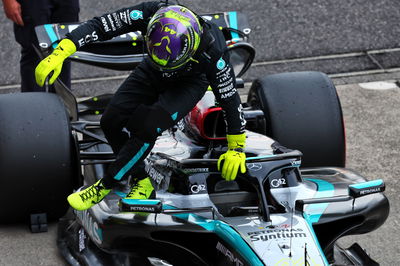Mercedes justify F1 Japanese GP strategy after Lewis Hamilton radio query
Mercedes explain the tyre strategies after a bad day for Lewis Hamilton and George Russell

Mercedes have justified their strategy call at the F1 Japanese Grand Prix.
The tyre strategy failed to pay off, with Lewis Hamilton finishing ninth and George Russell seventh.
The first-lap crash for Daniel Ricciardo and Alex Albon presented an opportunity for every team to find an advantage with the strategy at Suzuka.
Mercedes switched their drivers to hard compounds after the restart which resulted in Hamilton asking to “change the strategy” via team radio.
Hamilton’s lack of pace even saw him allow teammate Russell to pass him.
Mercedes changed their drivers to another set of hards, then switched to mediums at the end.
A Mercedes spokesman explained their decision-making afterwards: “With our tyre allocation (2 Hard, 1 Medium), we were able to give ourselves the possibility of looking at either a one or a two stop after the red flag.
“Hence the Hard tyre restart.
“Ultimately, as the race progressed, the tyre degradation showed that the two-stop was going to be the quickest way to the flag.
“Our second and third stints showed solid pace compared to those around us, including the McLarens and the Ferraris.
“We knew that Suzuka would not be our strongest track though and, with time lost being overtaken on the offset strategy (one of the downsides of this strategy), we couldn’t make it back to P6 which was likely the maximum today.”
Ferrari, notably, had greater success by committing early to a two-stop strategy.
Carlos Sainz finished third, and Charles Leclerc fourth.
Red Bull secured a 1-2 finish (their third in four grands prix this year) with Max Verstappen beating Sergio Perez.
Verstappen told Sainz afterwards in the cooldown room that committing to a two-stop strategy was optimal for Red Bull.
Mercedes, however, were left scratching their heads after a disappointing display in Japan.

![Toprak Razgatlioglu, ROKiT BMW Motorrad, BMW M 1000 RR [Gold & Goose]](https://cdn.crash.net/2024-09/GnG_1165424_HiRes.jpg?height=90)






![Johann Zarco, LCR, Honda RC213V, 2024 San Marino MotoGP, Misano, action [Gold & Goose]](https://cdn.crash.net/2024-09/GnG_1166323_HiRes.jpg?height=90)

![Jack Miller, KTM Factory Racing, KTM RC16, San Marino MotoGP, Misano, action [Gold & Goose]](https://cdn.crash.net/2024-09/GnG_1167624_HiRes.jpg?height=90)